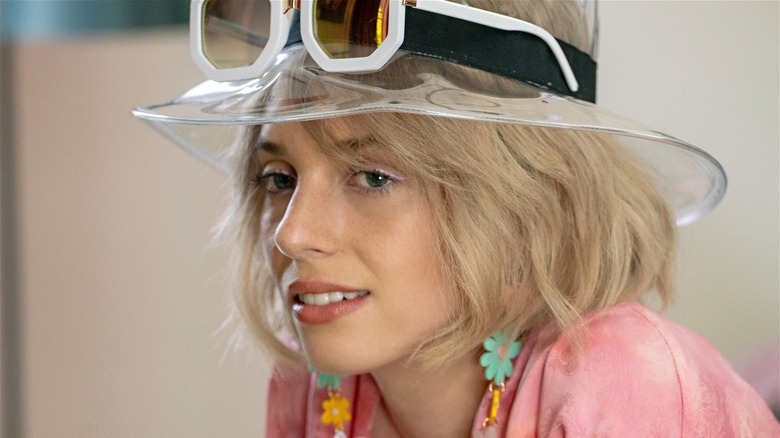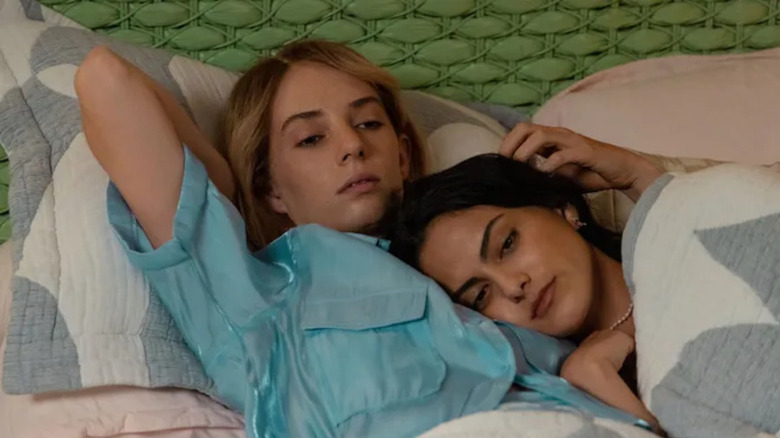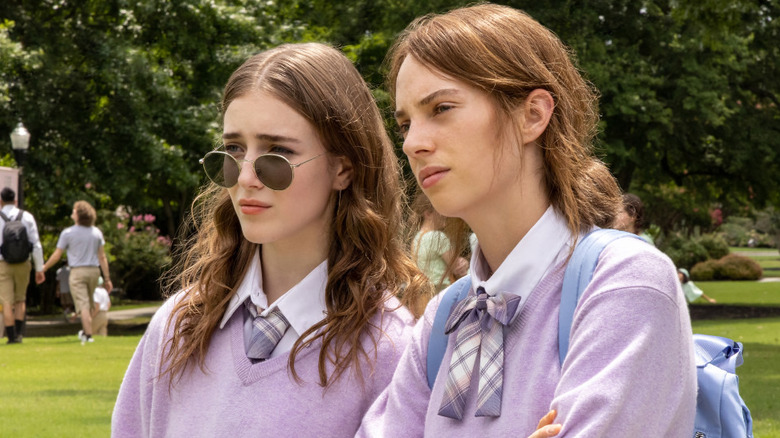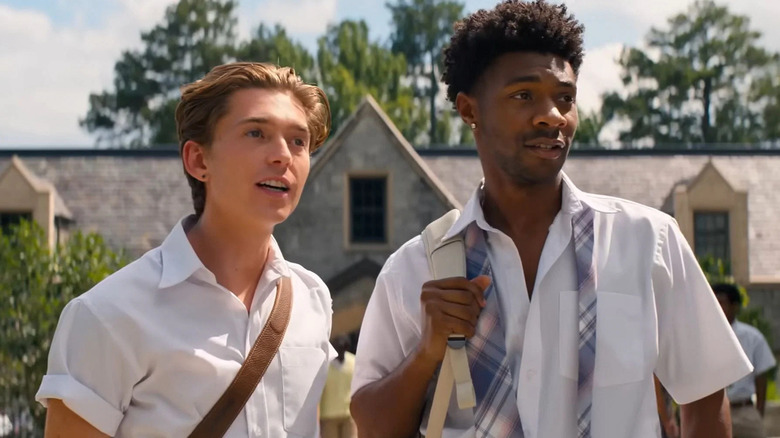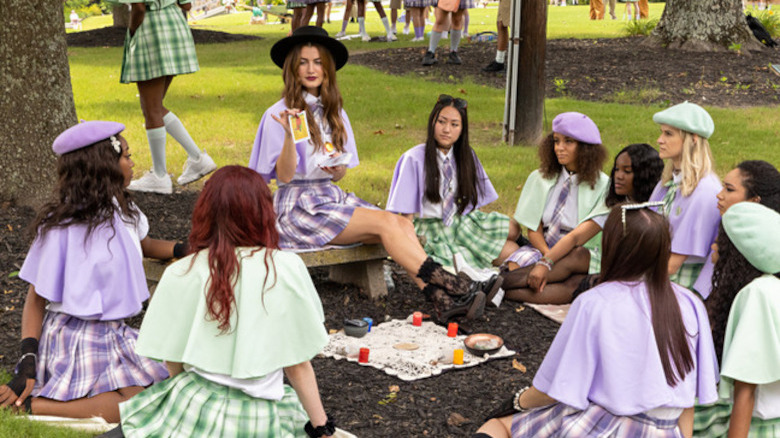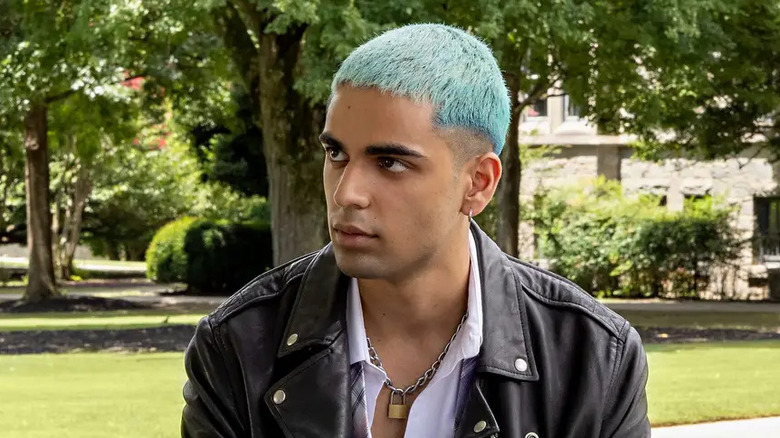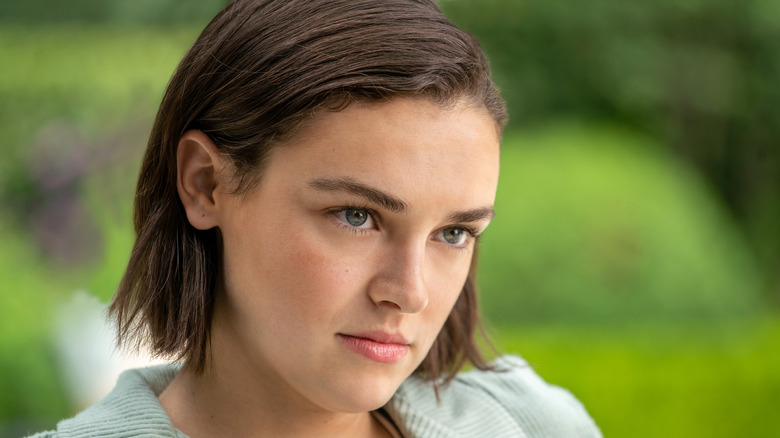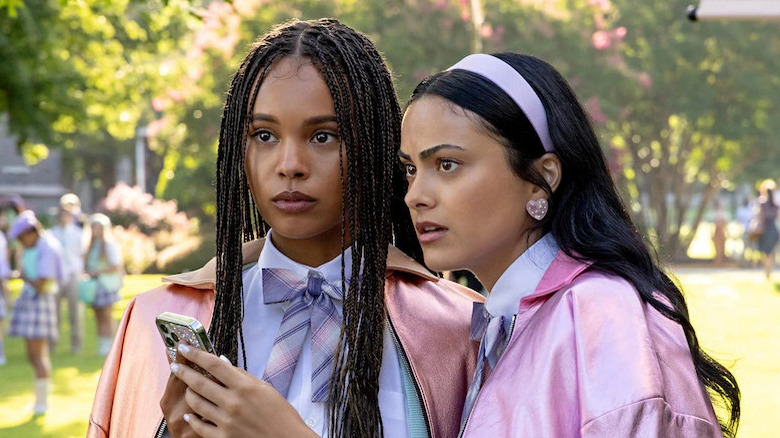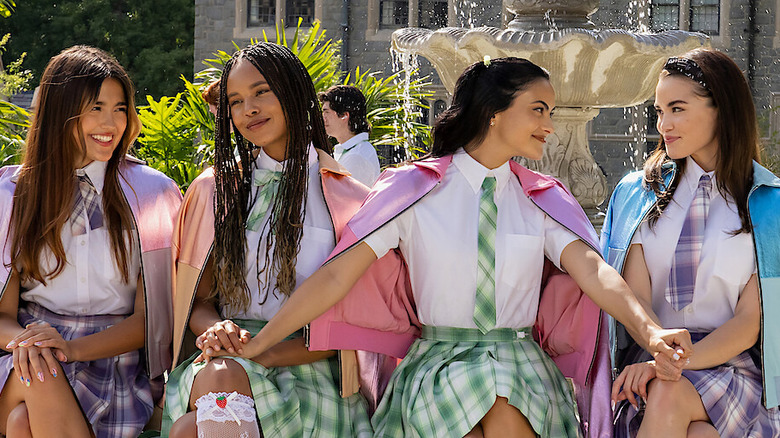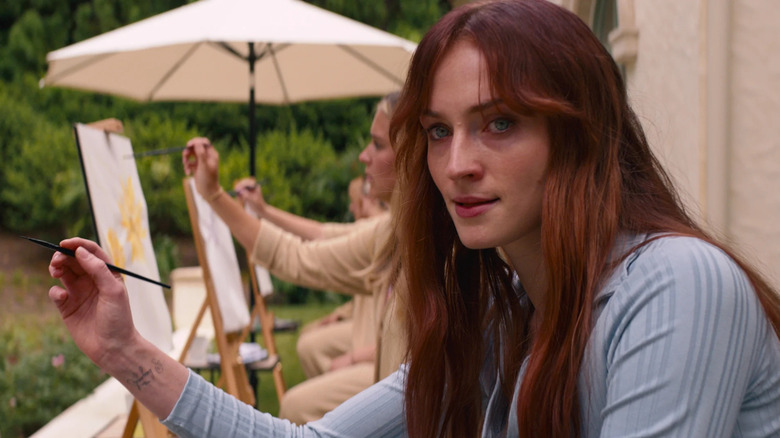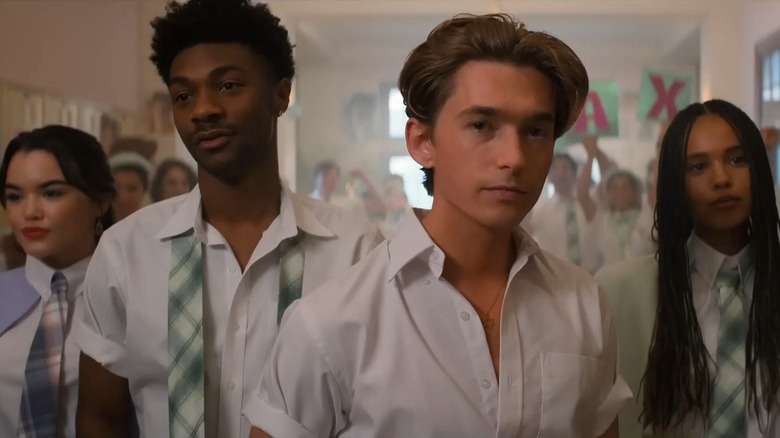The Ending Of Do Revenge Explained
Before 2022, we couldn't imagine a teen comedy that combines the power of "Clueless," "Election," "Mean Girls," "But I'm A Cheerleader," the John Hughes oeuvre, "Cruel Intentions," and "Jennifer's Body." If that sounds like your perfect movie, good news! Netflix's "Do Revenge" does all that and more. "Do Revenge" is a kaleidoscope of film references, fashion, and in-jokes ... and most of all, it features twists you won't believe.
The final act of "Do Revenge" has much in common with its Hitchcockian influences, but the strongest comparison for the ending would probably be 1998's "Wild Things," which ends with a similar cascade of queerness, gotchas, and double-crosses. In fact, the abundant movie references here can be used to understand the film on a deeper level, enhancing the experience by making us better able to predict what's going to happen next. Let's talk about the complicated, delightful ending of "Do Revenge," where the characters all ended up, and what all those references and asides really mean.
Drea and Eleanor
Drea and the artist formerly known as Nosy Nora have quite a journey in this film! From strangers to friends to enemies to besties, we can't take our eyes off these two. You'll recognize them from "Riverdale" (Camila Mendes as Drea) and from "being Ethan Hawke and Uma Thurman's kid" (Maya Hawke as Eleanor), respectively. (She also had her breakout role in "Stranger Things," to be fair.)
Writer-director Jennifer Kaytin Robinson previously created the brilliant MTV gem "Sweet/Vicious," which concerns itself with a lot of the same issues and fears as "Do Revenge." While "Sweet/Vicious" is about violence, "Do Revenge" starts with revenge porn — a different sort of violation — but the projects have a common link in the relationship between the female leads. Drea and Eleanor's relationship is the central story of "Do Revenge" (one reason we mention "Jennifer's Body" is this similarity): Drea, the scholarship kid who nevertheless rules the land, couldn't have less in common with Eleanor, the rich transfer student who's defiantly queer and out of place at their expensive Miami high school.
In the end, Drea and Eleanor have done so many crummy things to each other that all they have left is the authentic, caring feelings they have for each other. Drea has ruined Eleanor's birthday party during her downward spiral, and Eleanor reveals (in a very creepy scene at Drea's house!) that she engineered everything in the movie to do revenge on Drea herself, for a particularly cruel incident in their youth that Drea doesn't even remember.
Eleanor and Gabbi
Eleanor meets Gabbi (Talia Ryder), Max's (Austin Abrams) sister, in your typical meet-cute on the first day of school, which they follow up soon after at a house party. Their date at the boardwalk is one of the most romantic scenes in the whole film, so we're really rooting for them. Gabbi, like Carissa (Ava Capri), is an avatar of authenticity, and it's no mistake that two of the film's openly queer characters are the ones who represent the pure, direct honesty the film is desperately seeking.
One of the most interesting parts of the film is how little proof Drea has for the original act, for Max's betrayal by leaking the video, but she's just so sure. The movie eventually rewards her for this intuition — and for going on her own instincts no matter what. Gabbi and Eleanor break up when Gabbi overhears Eleanor and Drea hashing out their plot, but we know she still cares enough to confirm she believes Max leaked Drea's tape, which of course turns out to be true.
Eleanor gets Gabbi back in another one of the film's romantic scenes, this time during the end credits: She falls asleep while waiting for Gabbi to walk by so she can make a huge gesture. This is so quintessentially Eleanor — big ideas, weak on execution — that it charms Gabbi back right into her arms.
Drea and Max
It's interesting to rewatch "Do Revenge" knowing all the twists — it all makes for a very different movie! For example, you can watch knowing that Max leaked the tape, in which case the story goes that Max ruins his girlfriend and hooks up with her best friend, then goes after the new girl at school. But if he didn't, the story isn't much better for him: Max gets punched by his girlfriend, he's put on blast for all his cheating, he starts a feminist organization, and eventually confesses everything in a hate-filled rant.
We are given every indication that this movie is about Max and Drea, the couple at what seems like the center of the drama. But Max spends much of the film off-screen or hiding in his own shirt and under tables, and the movie isn't really about him, anyway; it's about Drea and Eleanor and Drea's relationship with the headmaster (Sarah Michelle Gellar). Max provides the motivation for Drea's plot and kicks the movie into motion, but he's a semi-villain for most of the film.
In the end, a fully villainous Max does come clean without knowing he's doing it, which is perfect for a blackmailer. High on cocaine, Max and his entire Admission Party crew is treated to a video of his confession. He runs outside to fall down on his knees in a scene that directly mirrors "Cruel Intentions," followed by Eleanor and Drea and the rest of the party coming out to watch him in his shame.
If you or anyone you know needs help with addiction issues, help is available. Visit the Substance Abuse and Mental Health Services Administration website or contact SAMHSA's National Helpline at 1-800-662-HELP (4357).
Allegra and the Instagram Witches
We all know the famous schoolyard breakdown scenes from "Mean Girls" and "Clueless," where a new student gets a tour of all the movie's relevant cliques. But "Do Revenge" updates the stock scene in a hilarious way — and nothing in the sequence is funnier than the addition of "Instagram Witches" to the list of things you can be. They dress like Stevie Nicks, but they aren't goth. Their aesthetic is closer to cottagecore. (Had the movie been written a year later, it's to be assumed the witches would be on TikTok.)
Allegra the Instagram Witch (Rachel Matthews) is positioned as the Amber (from "Clueless," played by Elisa Donovan) in many ways from the start. She and Drea share a mutual disgust throughout the film, but Allegra has her own social cache and can take her on — especially once Drea's fallen. Allegra is a good reminder, like Amber was, that high school is the last place you will ever have to be with people you don't like. Even if Drea hates Allegra, she still has to deal with her, and that's an interesting energy that doesn't really have an adult analog. In any case, the revelation that Allegra is also one of Max's affairs brings her back to the forefront, and she ends up looking pretty normal compared to her early, spider-centric look.
Drea and Russ
You can tell the movie is less interested in this B-plot than it is in the machinations and metamorphoses of its central relationship. But Russ (Rish Shah) is charming and very handsome, and it seems like we're meant to believe he's virtuous, since he works on the school farm, so he gets a pass.
It's almost like the big moves of Russ and Drea's relationship take place offstage: They start out butting heads on the farm and slowly warm up to each other, which we don't really see beyond a good helping of kindness from Russ whenever Drea's having a down moment. Then they have a sexy paintball fight and kiss. It's all very much believable, thanks to the actors, but if you wrote it all down there would be just a few scenes sketching out their entire story.
In the end, Russ overhears Eleanor and Drea discussing their plots, and is rightly horrified — but Drea gets him back over the end credits, by breaking into his art studio and painting him a huge, heartfelt apology. It's the perfect callback to their original kiss, and the blank canvas also represents her attempt at cleaning up the rainbow-painted messiness of their previous relationship.
Carissa
Carissa, the vegetarian leader of the farm, is an interesting case. We spend the first act of the film thinking she is the worst villain of all, the person who hurt Eleanor, until Drea gets her taken away to a high-class rehab center due to growing drugs and dosing the senior class. This all makes us curious about the local drug laws, because grow houses generally carry a mandatory minimum sentence. According to Florida law, the amount of marijuana that Carissa is growing would get her three years in jail, but we can assume that as a minor she got diverted to treatment instead.
In any case, it's only in rehab that the camera seems all that interested in Carissa, and as she identifies the real villain in Eleanor's story — being Drea herself — and it's the last time we see her. Eleanor's chaos is one way of being, Drea's high-tension catwalk is another, but it's Carissa's denigrated "human Birkenstock" ethos that gets identified with truth and honesty, which are in short supply for much of the film. It's only after Drea's visit to Carissa that anything starts to change because she is the only person with no need to lie. She is who she is, having figured out the moral of the story long before anybody else.
Tara
Tara (Alisha Boe) is another side character who's worth a look — as Drea's rich former bestie, Tara can tell us a lot about the kind of relationships this part of society values. She starts the movie with a truly, ridiculously opulent birthday party for Drea, which shows how little she cares about money and how much she cares for her best friend. She's Drea's main point of contact with their group, so it seems harsher coming from her when they have to cut her off.
It's telling that Drea immediately understands what's happening — that she knew on some level her place in their group was contingent on their goodwill. But being the only person we hear express regret for cutting Drea off, it's no surprise that Tara's the first to reach out after Drea's car accident, awkwardly kind when they return to school, and the first to forgive all.
In the end, Tara has lost Max — and good riddance, of course, even if the movie leaves us hoping the best for him too — but she still has Meghan (Paris Berelc) and Montana (Maia Reficco) to fall back on now that Drea has a new bestie in Eleanor.
Meghan and Montana
Meghan and Montana are interesting as a sort of Greek chorus, commenting on the action. Looking at it as a writer, we could posit that they say the things that are too mean for Tara to say — funny lines, often very cruel, which would probably change our opinion of her. But since this pair is introduced already acting wild — particularly the violent Meghan, whose hilarious introduction in the film is practically her only scene — they can get away with a lot more.
We're reminded of the original "Gossip Girl," in which Kati (Nan Zhang) and Isabel (Nicole Fiscella) follow Blair Waldorf (Leighton Meester) around as her minions, and serve much the same purpose — although a better comparison might be the HBO Max reboot of "Gossip Girl," in which Luna (Zión Moreno) and Monet (Savannah Lee Smith) play a similar role but are often part of the action in a way Kati and Iz never were. Meghan and Montana end the film as they began it: by cracking each other up at other people's misfortune, essentially.
Erica
Erica (Sophie Turner) is worth mentioning, if for her hilariously unhinged performance alone as the tennis camp attendee Drea frames for possession of cocaine. (That's a Schedule 2 controlled substance in Florida, and legally speaking it's a third-degree felony that is punishable by up to five years prison or probation and a $5,000 fine, as well as having her driver's license revoked for two years.)
Yes, it's pretty wild that Drea pulls this drug frame job on multiple enemies, but in this case Erica ends up diverted to the same rehab center as Carissa. One might wonder whether any of the other in-patients are also there to beat a drug charge! And of course, we wonder whether Max will end up there once his own cocaine confession goes live.
Erica helps us see how much Drea has changed. In her first appearance, she's a classic Mean Girl who melts all the way down after her framing. But when Drea goes to visit Carissa, she has another run-in with Erica, who is very honest about the fact that Drea ruined her life. She's clearly not recovered yet and even admits to gaining a real-life cocaine problem thanks to the stress of her experience. It seems Erica is in rehab for the long haul, as the last time we see her she's painting a devilish picture of Drea for her Arts and Crafts therapy.
If you or anyone you know needs help with addiction issues, help is available. Visit the Substance Abuse and Mental Health Services Administration website or contact SAMHSA's National Helpline at 1-800-662-HELP (4357).
Max
If "Do Revenge" is ultimately about the complex and intense relationship between Drea and Eleanor, that leaves Max without a real purpose. The movie literally tells us he is "patriarchy incarnate" fairly early on, and that's exactly what he is — and what he represents. It's Max who leaks the original video, Max who plays Eleanor and Drea off one another, and ultimately Max who is revealed to be hooking up with half the school. That's something that would be disastrously unacceptable for a girl (sexism strikes again), but for Max it's barely one of the multiple things he ends up paying for.
While Max pretends to be a feminist — even starting the bizarre and hypocritical "Cis Hetero Men Championing Female Identified Students League" — in the end Max joins a men-only support group called "Masculinity Examined: How to Untangle the Toxic Roots of Patriarchy," where he can finally share his feelings and begin to heal from his own patriarchal wounds.
It's reminiscent of the end of "Sweet/Vicious," in which the Batman and Robin nature of the lead duo becomes in the finale the formation of a sort of feminist Justice League, with all kinds of allies and victims coming together in righteous anger. In both cases, the story breaks down its own male vs. female conflict by giving both parties the opportunity to change, grow, and become marvelous.
Drea and the Headmaster
It's exciting to see Sarah Michelle Gellar for a few reasons: The first is that she rules, the second is Buffy, and the third is your slow realization that she's here not as a "Buffy" reference but a "Cruel Intentions" one. Her character in that film, Kathryn Merteuil, plays someone a lot like Max, actually: All golden boy on the outside, dissolute cokehead in secret. Here, Gellar plays a far-sighted, wise, and funny Headmaster (not, note, "Headmistress"), who checks in a few times throughout the film to give us another angle on the action.
Gellar's Headmaster is one of the few adult speaking roles and certainly the only one that matters. Especially at the end of the film, when she sits with a reborn Drea and advises her — directly into camera, so she's talking to us as well — "May I let you in on a little secret? Your whole life, you've been cocooned. Everything you've done, everything that's happened to you, has brought you to this moment. And now you're a butterfly. A beautiful kaleidoscope of trauma and resilience. I know it feels like hell, but you are never more alive than when you're 17 years old. F*** figuring out who you're meant to be — stay lost as long as you can."
It's a powerful, beautiful message for a film about letting yourself exist, which none of us are perfect at doing. But "Do Revenge" is a great reason to keep it in mind. Stay lost, as long as you can.
